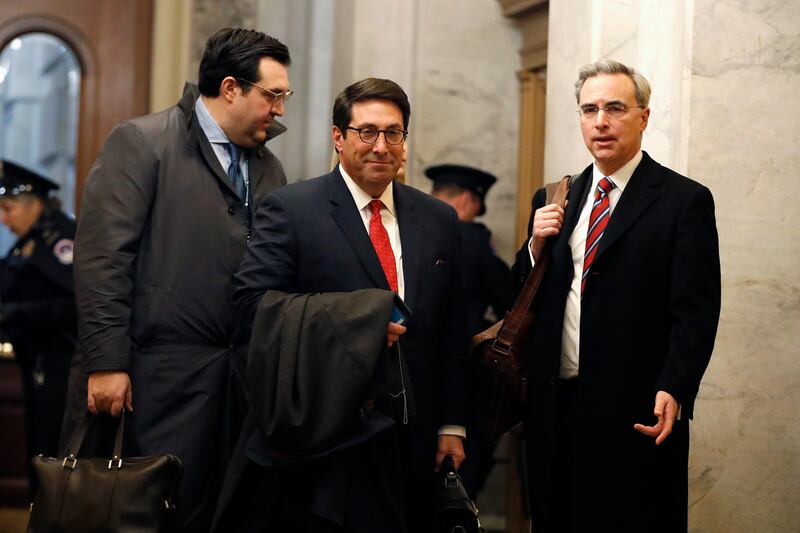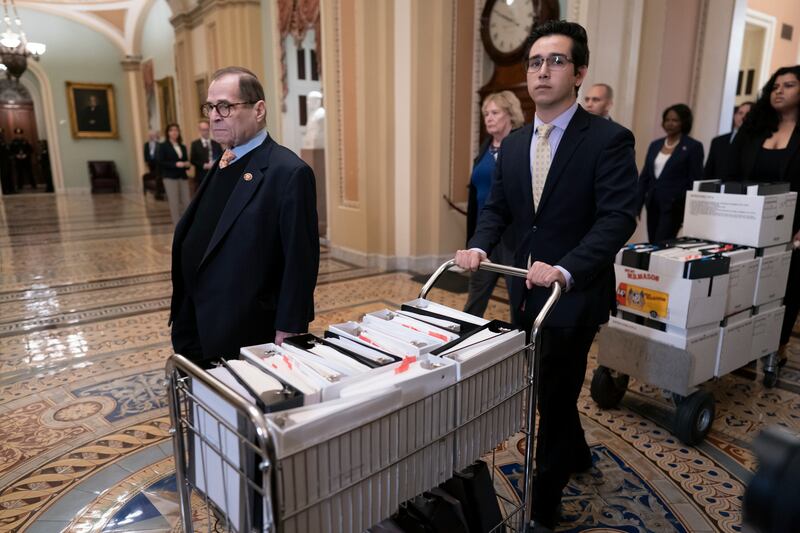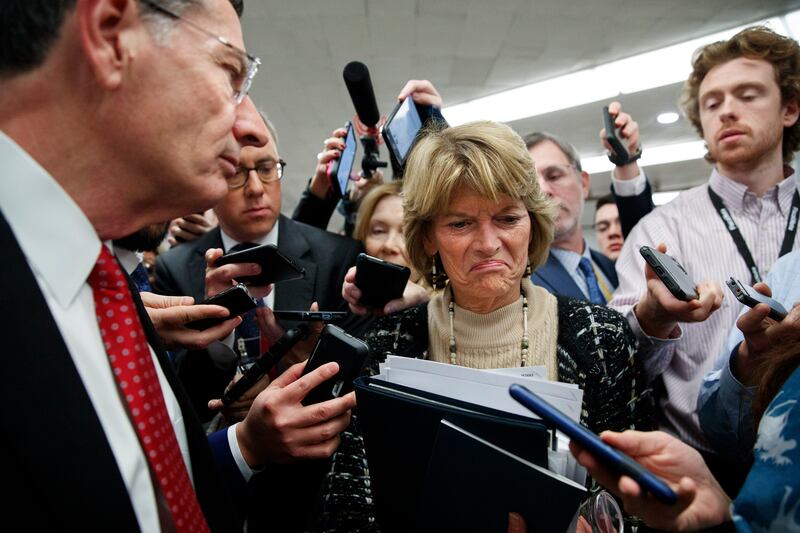WASHINGTON — After the impeachment trial adjourned Saturday, senators descended to the basement of the Capitol where small subway cars take them underground to their office buildings across the street.
Those who had something to say stepped up to a microphone on the train platform surrounded by a hoard of journalists eager for a soundbite from senators who have to sit silent for hours during the trial.
This time, the group of Republican senators who usually engage the news scrum were noticeably upbeat — and it wasn’t just because the session was brief compared to the eight- to nine-hour marathons they’ve endured the past three days as House managers presented a detailed case against President Donald Trump.
“Within two hours, I thought the White House counsel and their team entirely shredded the case that has been presented by the House managers,” said Sen. Joni Ernst, R-Iowa, assessing the White House legal team’s first shot at defending the president against charges of abuse of power and obstruction of Congress.

Four attorneys from the defense team took turns attacking the case presented by House Democrat managers, describing it as a narrative filled with half-truths thrown together in a process that denied Trump his legal rights to a fair process. And the attorneys repeatedly reminded senators that their vote in the historic impeachment trial has broad ramifications.
“They are asking you not only to overturn the results of the last election,” White House counsel Pat Cipollone told senators, four of whom are seeking the Democratic nomination to run against Trump in November. “They’re asking you to tear up all of the ballots all across the country on your own initiative, take that decision away from the American people.”
The House impeached Trump in December, charging him with abusing his office by asking Ukraine for politically motivated probes of former Vice President Joe Biden, a frontrunner in the upcoming Democratic primaries, while withholding military aid from the U.S. ally that’s in a territorial war with Russia. The second article of impeachment accuses Trump of obstructing Congress by refusing to turn over documents or allow top aides to testify in the House probe.
Democrats spent the past week claiming the evidence is overwhelming. Republicans have responded with “nothing to see here” and Saturday worked to change the narrative, one that will continue on Monday after a Sunday break.
Trump is the third president to be impeached and face a trial in the Senate. No president has ever been removed from office and the GOP-controlled Senate is expected to acquit Trump.
Using the same approach as House managers, Cipollone’s team played video clips of witnesses in the House impeachment inquiry and of lead House manager Rep. Adam Schiff, D-Calif. Each presentation carried a common accusation that the prosecution hid facts and details that didn’t fit a “predetermined outcome” and engaged in “mind reading” to conclude the motives of President Trump and Ukraine President Volodymyr Zelenskiy.
“They think you can read minds,” Trump attorney Jay Sekulow said, pointing at the House managers seated to his right. “I think you should look at the words,” he added, pointing to the lectern where he read from the transcript of a phone call between Trump and Zelenskiy.
A whistleblower complaint about that July 25 phone call between the two leaders is central to the impeachment inquiry House Democrats launched in September. House managers allege the transcript of the call shows Trump asking “a favor” of Zelenskiy to investigate the Bidens in return for nearly $400 million in military aid and a coveted Oval Office meeting with the president.
House managers allege this was a quid pro quo amounting to enlisting a foreign power to interfere in a U.S. election and called on senators to remove Trump because his conduct poses a threat to U.S. security and the integrity of the nation’s electoral system.
But Trump’s team offered a very different interpretation of the call’s transcript. Sekulow said the favor Trump sought wasn’t for himself but for his country. He wanted the assurance that Zelenskiy was committed to rooting out corruption and to having other European nation’s contribute to Ukraine’s defense so U.S. dollars aren’t misspent.
Repeating a common defense from the White House during the impeachment inquiry, Sekulow also noted that the aid was released — six days after Ukraine convened its anti-corruption court — and a meeting between the two leaders took place Sept. 25 at the United Nations, followed by a news conference where Zelenskiy said “nobody pushed me.”

“Every time the Democrats say that President Trump made demands or issued a quid pro quo ... they are saying the President Zelenskiy and his top advisers are being untruthful,” said White House attorney Mike Purpura.
Responding to the obstruction of Congress charge, White House attorney Patrick Philbin cited legal precedents to claim the House subpoenas were not valid without a vote from the whole House that an impeachment inquiry had been launched.
Another unprecedented move by House investigators was to hold two sets of hearings without allowing the president’s counsel to attend and cross-examine witnesses. The only hearing Trump’s lawyers were invited to attend was the House Judiciary Committee, which the White House turned down because it wouldn’t allow them a chance to question witnesses or present their own.
“Why would you have a process like that,” Philbin asked senators. “What does that tell you about the process? Cross-examination is the greatest legal engine ever invented for the discovery of truth.”
Virginia Democratic Sen. Tim Kaine jumped on that statement when he stepped to the microphone as reporters reached in with their recorders and the cameras were rolling.
He said Philbin made a more powerful argument for more witnesses at the Senate trial than House managers did in a 13-hour session Monday in which 10 subpoenas for witnesses and documents were rejected by the GOP majority.
“If cross examination of witnesses is necessary to discover the truth, how dare the White House and how dare the Senate majority even contemplate a trial without witnesses or documents,” Kaine said.
Democrats are hoping to lure at least four GOP senators to vote in support of calling more witnesses before the Senate renders its verdict. Among those expressing interest in hearing additional testimony is Utah Republican Sen. Mitt Romney, who said before the trial that he would like to hear from former national security adviser John Bolton.
He told CNN that “it’s very likely” he’ll vote in favor of witnesses but he won’t make that decision until arguments are completed.
Asked if Democrats will have the votes to call additional witnesses, Kaine said it was too early to say.
“But if they stay on this point that the resolution of these factual disputes really matter, I think they’re going to increase the necessity of getting witnesses and documents,” he said of Trump’s legal team.
That vote will take place later next week, after White House counsel finishes presenting its case and senators have a chance to question both House managers and Trump’s defense team.


